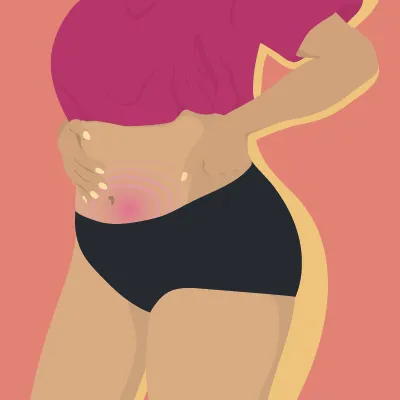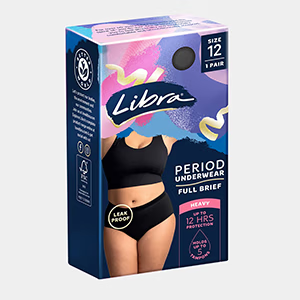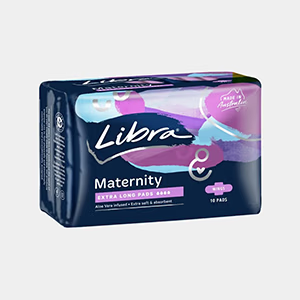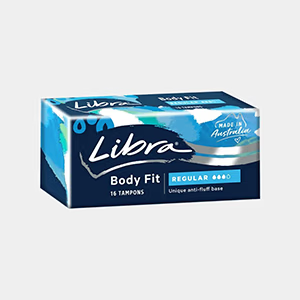Aug 29, 2023
What Is A Heavy Period?
It’s no secret that our period can sometimes be a little inconvenient. Whether it’s the PMS symptoms that come with it or its timing just so happens to clash with a festival we’ve been looking forward to for months. But for those who experience heavy menstrual bleeding, it can throw a real curveball into their day-to-day life.
Previously known as menorrhagia, heavy menstrual bleeding is not uncommon, affecting about one in four people with periods. However, it often flies under the radar. So let's change that and have an open conversation about what's going on with our bodies. If you're constantly swapping out pads or tampons, stressing about leaks, and feeling overwhelmed, you're not alone. Let's dive in.
What exactly qualifies as a heavy flow?
Well, it's when the amount of blood loss significantly impacts your daily life.
Look out for signs like;
- Bleeding through your pad, tampon or period undies
- Needing to change your period products every hour or two
- Waking up throughout the night to replace your period product
- A period that lasts for more than seven days
- Experiencing blood clots larger than a 50-cent coin
- Feeling unusually tired and short of breath
What causes a heavy period?
There are a number of factors that can lead to heavy menstrual bleeding. These include:
- Hormonal imbalances: When oestrogen and progesterone are out of balance, it can cause the uterine lining to thicken abnormally, causing heavier bleeding. There are a few conditions that can cause hormone imbalances, including obesity, insulin resistance, thyroid problems and PCOS.
- Anovulation: This is when the ovaries don't release an egg during a menstrual cycle. This leads to a hormone imbalance and may result in heavy menstrual bleeding or unexpected bleeding between periods.
- Endometriosis: Endo is a condition where cells, similar to those in the uterine lining, grow outside the uterus, particularly around the ovaries and uterus. These cells form patches that bleed and release fluid during menstruation, causing inflammation and scarring.
- Adenomyosis: This is a condition where cells similar to those that line the uterus are also in the muscle wall of the uterus. During a period, these cells bleed and form pockets of blood trapped in the muscle wall, leading to heavier and more painful periods.
- Uterine fibroids: These are benign growths in the uterus that can increase blood flow.
- Polyps: These are benign growths in the uterine lining that can cause heavy bleeding.
- A side effect from an IUD: Heavy menstrual bleeding is a well-known side effect of using a hormone-free IUD for contraception.
- Pregnancy complications: A single, heavy, late period may be due to a miscarriage. Another cause of heavy bleeding during pregnancy is due to the placenta being in an unusual location. If you’re pregnant and experience heavy bleeding, schedule an appointment with your doctor.
- Genetic bleeding disorders: Some bleeding disorders that run in families can cause heavy menstrual bleeding.
- Medicines: Some medicines may result in heavier or longer than usual periods.
- Cancer: Uterine or cervical cancer can cause unexpected or heavy menstrual bleeding. While it’s more likely to be one of the above causes, if you’re concerned, there’s no harm in checking with your GP.
Are there complications to heavy bleeding and what treatments are available?
Due to the increased loss of blood, heavy menstrual bleeding can lead to a few complications.
- Iron deficiency anaemia: Excessive blood loss, depletes your iron levels and causes fatigue, shortness of breath, and pale skin.
- Severe cramps: Heavy periods often come hand in hand with painful cramps, causing severe discomfort and making everyday tasks feel like an uphill battle.



Treatment can vary based on the cause behind your heavy period. The best starting point is to talk to your GP. A doctor can work to diagnose the underlying cause, refer you to a gynaecologist or recommend the best course of treatment for you. They’re there to help, so there’s no reason to feel hesitant about scheduling that appointment! Along with what your GP recommends, there are also some ways to help manage your heavy period and the symptoms that come with it.
- Super absorbent period products: Opt for period care with a high absorbency so you feel secure and protected. More on this later!
- Take iron supplements: If needed, your GP might recommend iron supplements to replenish those precious iron stores.
- Hydration is key: Keeping up with your H2O prevents dehydration and fatigue, both of which can worsen during heavy periods.
- Heat therapy is key: Applying a hot water bottle or heat pack can be very effective in alleviating menstrual cramps.
- Prioritise rest: Don't feel bad about taking breaks and prioritising self-care during your periods! Listen to your body and give it the R&R it deserves.
- Consider pain medication: Over-the-counter pain medication like paracetamol can help manage bad cramps as well.
Period products to help manage your flow with confidence
When it comes to period care, finding the right product for you and your flow is key. The Libra Goodnights Range of pads offers pillowy comfort and amazing absorbency. They’re super absorbent, designed to keep you protected for up to 12 hours. The Extra Goodnights Long & Wide Pads & Ultra Thin Goodnights Long & Wide Pads, have added length and a wider back for maximum protection.

Our Goodnights Pants are highly absorbent and provide 360° protection that fits to the contours of your body. Looking for a reusable option? Our Period Proof Briefs can hold up to 4 tampons’ and 5 pads’ worth of menstrual fluid, not to mention, they’re stylish and super comfy.
It’s important to note that just like you go through your different eras, so can your period! You may notice your period is heavier than it used to be, and that’s okay. Heavy periods affect many of us, but understanding what's normal for you and seeking help can make a world of difference. Listen to your body, and if you’re concerned, reach out to a medical professional.
Love, Libra x
Essity Australasia makes no warranties or representations regarding the completeness or accuracy of the information. This information should be used only as a guide and should not be relied upon as a substitute for professional, medical or other health professional advice.







